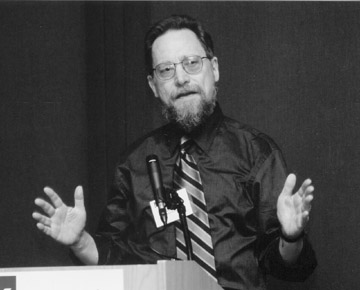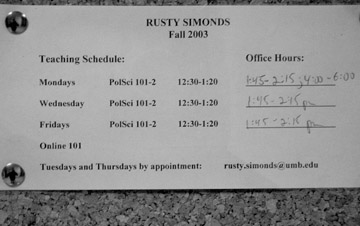Professor Rusty Simonds Passes Away

Photo by Harry Brett
October 31, 2003
For the first time in a long time, the door to Wheatley Hall room 5/066 was closed. The Political Science Department office belonged to Professor Arthur “Rusty” Simonds.
Rusty Simonds passed away on Monday, October 20 from a pulmonary embolism while working on an AQUAD review of the department on his home computer. He was sixty years old.
News of his death hit the university hard. Students and faculty gathered on Wheatley’s fifth floor during the week to reminisce and mourn their colleague, mentor, professor, and friend.
“In thirty years, I never saw him impatient [with a student]… I don’t know how he did it,” close friend and colleague, Professor Diane Paul said. “His door was always open.”
Posterboard and markers were laid out in the hallway for students, staff, and faculty to write their thoughts of Simonds, which will eventually be given to his family.
“Rusty, you were just cool man; without even saying anything, you had the ability to keep people on the right track. To me, you’re still here,” wrote a student named Shanna.
Another put, “I will miss your humorous approach to teaching that created a comfortable atmosphere in the classroom.”
Simonds came to the university in 1969, five years after the it was first established. He was sixty days away from retirement. He garnered the Chancellor’s Award for Distinguished Teaching twice, once in 1980 and again in 2002. Simonds was quoted in a memo from the provosts office, “[T]he democratizing of learning is the point of public higher education, it is the promise that brought me to UMass Boston in 1969 and it is the reason I have never, for all the aggravations we’ve made for ourselves, regretted that decision.”
Jack Spence, associate dean of the College of Liberal Arts and a faculty member since 1973, was with Simonds when there were two liberal arts colleges. Simonds chaired the Political Science Department three times during some of the department’s hardest periods, such as when they received twelve cuts in funding and the loss of several faculty members just as interest in the major was going up. It was his third time serving as chair when he passed away.
“He engaged people, students and faculty,” Spence said. “He just had more than a full measure of life’s vital juices.”
Political Science Professor Roger Feinstein said it was a “tremendous loss.” Feinstein told of how there were times he wanted to speak with Simonds, and Simonds would be in his office with a student for hours at a time. “He was the most patient member of our department,” he said.
Kate Hartford, professor and member of the department’s executive committee, who called Simonds’ death “unsettling on many different levels,” said they were “moving on a number of fronts,” to make the adjustment for students as smooth as possible.
Political Science Professor Charles Cnudde learned about Simonds’ passing after returning from substituting one of his classes. “It was a shock to come back after teaching his class to hear about it,” he said. Before hearing the news he had told the class that Simonds would have a speedy recovery.
Maureen Worth, a student who took four classes with Simonds and for whom he was an “unofficial advisor,” said he wasn’t overly concerned with formalities, but at the same time, he got done what needed to be done. She considers herself lucky to have had the classes.
In the fifteen months he has been here, Provost Paul Fonteyn says he has met 90% of the faculty. Out of all those, a handful stand out, and Simonds, an “eternal optomist,” was one of them. More than one person confirmed to Fonteyn that a line in the broadcast memo informing the university community of his death, of how he was critical to the development of the university, was prophetic. Unique in his enthusiasm, Simonds epitomizes what we all wanted to emulate, Fonteyn said. “People need symbols, leaders, and he led by example.”
Associate Provost Winston Langley, a Political Science professor, thought of Simonds not just as a colleague, but as someone who cared for all aspects of students’ lives. “He wasn’t simply serving the department, the university, or the taxpayers, but there was a devotion to helping human beings realize the promise they hold within themselves.”
When Brennan Adams first transferred to the university, he had been thinking about majoring in Political Science, but was unsure. After enrolling in Simonds’ Political Science 101 course, and seeing his passion, Adams felt convinced to stay and was instilled with a sense of pride in being a Political Science major. Now a senior, Adams is a teaching assistant for Simonds’ 101 course, which holds 120-plus students. “He was endlessly generous, not only with time and knowledge, but he was caring in a personal way with students as well,” he said, telling of how even in a class of over a hundred, on the first day working with him, Simonds told Adams that it was his goal to know everyone by name by the end of the semester.
“He both adored and respected UMass students,” Diane Paul said. He showed it by challenging them to meet the highest academic standards, believing that they could do work at the highest level, and that to do right by the students was to show confidence in their abilities, she said.
Paul and Simonds were to retire together this spring so that they could meet every week to discuss their research and keep one another on track.
Chancellor Jo Ann Gora called his passing “so unfair.” He had “so much more to contribute and he was so adored,” she said. Simonds was one of the faculty members mentioned in Gora’s inauguration speech two years ago. “He was one of the members I got to know because he had strongly held opinions that were thought through,” she said, stating that in each conversation she had with him, the intense caring and concern for his students shone through. Gora told of how, most recently, Simonds had written to her about a computer replacement program with concerns about faculty being made to sign release forms. The release forms were dropped after several conversations. Gora had planned to visit his 120-student class that Wednesday, but was told to stay away because counselors were coming.
Judith Roberts, assistant dean for the College of Liberal Arts, wasn’t sure of what to say at first, still reeling. She paused and then said that Simonds was “a wonderful human being” and often acted as the “voice of reason.”
“We wouldn’t be operating if it weren’t for people like that… Among people like Rusty, Rusty was at the top. There aren’t a lot of Rustys.”
A memorial service is planned for December 1 at 2pm in the Memorial Church at Harvard University.
He leaves behind a wife, Kathleen McCaffrey, son Ethan Nasr, sisters Judith Jordan and Deborah Russell, as well as twelve nieces and nephews.
For those interested in posting thoughts, anecdotes, and witticisms of Simonds’ (and there are undoubtedly many), go to www.pollycyber.com/rusty/wwwboard.html.











































































